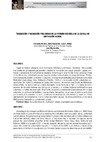Please use this identifier to cite or link to this item:
https://accedacris.ulpgc.es/jspui/handle/10553/59820
| Title: | Traducción y validación preliminar de la versión española de la escala de motivación global | Authors: | Grijalvo Lobera, Fernando Fernández Sarmiento, Celia Núñez Alonso, Juan Luis Martín-Albo Lucas, José |
UNESCO Clasification: | 5701 Lingüística aplicada 570112 Traducción |
Keywords: | Autodeterminación Motivación global Propiedades psicométricas Self-determination Global motivation, et al |
Issue Date: | 2011 | Journal: | INFAD | Abstract: | Según el modelo jerárquico de la motivación intrínseca y extrínseca (Vallerand, 1997) existen tres niveles de generalidad que permiten estudiar la motivación con mayor precisión: global, contextual y situacional. El nivel global se establece de forma general en la vida de las personas y trata de las diferencias individuales que permanecen relativamente estables a lo largo del tiempo. El objetivo del presente estudio fue traducir al español y analizar las propiedades psicométricas de la Global Motivation Scale (Guay, Blais, Vallerand y Pelletier, 1999) en una muestra de 237 estudiantes universitarios.
Se realizó la estrategia de traducción inversa, denominándose Escala de Motivación Global (EMG). Se llevó a cabo un análisis descriptivo de los ítems de la EMG, un análisis de correlaciones de los siete factores que configuran la escala y un análisis factorial confirmatorio para determinar la validez de constructo. Finalmente, se realizó un análisis de la consistencia interna para determinar la evidencia de fiabilidad. Los resultados demuestran, en general, el continuo propuesto por la teoría de la autodeterminación, confirman la estructura de siete factores y muestran niveles satisfactorios de consistencia interna. Estos resultados apoyan, de forma preliminar, el uso de la EMG para la evaluación de la motivación global. According to the Hierarchical Model of Intrinsic and Extrinsic Motivation (Vallerand, 1997) there are three levels of generality that allow studying the motivation more accurately: global, contextual and situational. The global level generally settles in people`s life and deals with individual differences that remain relatively stable over time. The aim of this study was to translate into Spanish and to analyze the psychometric properties of the Global Motivation Scale (Guay, Blais, Vallerand and Pelletier, 1999) in a sample of 237 university students. We performed the reverse translation technique. We carried out a descriptive analysis of the items of the GMS, a correlations analysis of the seven factors that form the scale and a confirmatory factor analysis to determine construct validity. Finally, we carried out an analysis of the internal consistency to determine the reliability. Results showed, in general, the continuum proposed by the self-determination theory, confirmed the structure of seven factors and showed satisfactory levels of internal consistency. In conclusion, results preliminary supported the use of the GMS to assess the global motivation. |
URI: | https://accedacris.ulpgc.es/handle/10553/59820 | ISSN: | 0214-9877 | Source: | INFAD [ISSN 0214-9877], v. 5 (1), p. 537-544 | URL: | http://dialnet.unirioja.es/servlet/articulo?codigo=5876636 |
| Appears in Collections: | Artículos |
Page view(s)
240
checked on Jan 16, 2026
Download(s)
107
checked on Jan 16, 2026
Google ScholarTM
Check
Share
Export metadata
Items in accedaCRIS are protected by copyright, with all rights reserved, unless otherwise indicated.
